#⦗✦| To the whichever boy part..... you can interpret who it could be among your lovely lil set ♡
Explore tagged Tumblr posts
Text

❧ beauty and the beast sentence starters ☙
➤ @slytherintragedy asked: ’ Well, perhaps there’s something there that wasn’t there before. ’ - Samira

The words made Hermione come to an abrupt halt in her movements. Bloody hell. Not a chance! She vowed, especially after Ronald, that romance just wasn't in her future. Because really, look how badly that turned out? Her pining for him for years ( as well as maybe some other boys that she won't mention ), him going out with Lavender for a bit, and then sharing a bloody rushed, ❛in the moment❜ kiss in the Chamber of Secrets... and then for it all the be awkward afterwards. They broke up before she came back to Hogwarts, which made things rather rocky, but then... the final year started.
And it had been something. She'd made ❛amends❜ with some of the Slytherins, Samira being one — not that she'd say they were good friends, but friends was good enough — and... some were more unexpected than others. The Greengrasses, Parkinson... Nott, Zabini, Pucey, Malfoy... Gods. Some of them, well, she felt like some things were happening, but Hermione's way of reading the room was through facts and clear visuals. Sometimes she didn't quite catch the hints of things, especially when it came to boys. Try dealing with Harry Potter and Ronald Weasley for several years; especially Harry, the king of being oblivious.

The words made her feel warm all of a sudden, heat rising at the back of her neck and making it more evident on the witch's freckled cheeks, redness dusting over the bridge of her nose. Her brows creased in denial, her eyes darting away as her lips pressed in a thin line, ❝I have NO IDEA of what you're talking about!❞ She hisses. Yeah, they might've been discussing their classmates, particular ones, but she wasn't just going to admit to something like that. Merlin, they'd love that, wouldn't they? Especially a certain boy. Which boy? She wasn't letting that out. Samira clearly knew, but Hermione Granger wasn't going to openly admit to having feelings for a Slytherin! Not yet, anyway. She didn't know if they were THOSE sort of feelings, for Melin's sake! ❝Things might be different now,❞ The war being over, everyone growing up and beginning to get along, be civil at least, ❝But that doesn't— it doesn't mean—❞ The cuts in her words, you could hear the frustration growing in her tone. Not to Samira herself, but the denial of it, ❝When did this subject turn to me? Could we not go back to discussing — oh, I don't know — your goings on?❞ Using her hands to gesture between the two of them before her index finger loosely pointing at her friend, poking her arm.

#✦ 𝐀𝐂𝐂𝐈𝐎 ➜ 「 In Character 」#✦ 𝐄𝐗𝐏𝐄𝐂𝐓𝐎 𝐏𝐀𝐓𝐑𝐎𝐍𝐔𝐌 ➜ 「 Answered 」#✦ 𝐕𝐄𝐑𝐒𝐄 𝟎𝟏 ➜ 「 Eighth Year 」#﴾ slytherintragedy ﴿ ⇢ Samira Starmist#⦗✦| To the whichever boy part..... you can interpret who it could be among your lovely lil set ♡#⦗✦| wow i wrote big on this one WOOPS
1 note
·
View note
Note
(Super long ask ahead)
Ok I really wanted to add and talk more about how bad the wiki got, just look at some of this lines:
As is common for a fictional underdog, Ron has a tendency to have low expectations of his performance and to set low standards for himself, both academically and socially. He lacks focus and often appears to fare poorly due to either a lack of effort and a lack of belief in his own abilities or through trying too hard and coming across as a clown.
Shocker, he is a teenager boy who sometimes can be insecure and seem awkward, as the series goes on he gains more confidence in himself, but why do they make it sound so mean? Going on a bit of a tangent here with this being a personal headcanon, but doesn’t this also sounded kind of albesit? because come on how many times have somebody called a person with adhd that they are “ lazy”, that they”lack effort” or “focus”? This so unnecessarily mean
His efforts to fit in are often hampered by the fact that he is moderately hyperactive and has a tendency to act with a pronounced level of immaturity, which has earned him a reputation as a loser among his peers. However, for the most part, Ron's type B personality means that he either does not notice this, and thus tends to embarrass those around him more than himself
I mean it was shown that Ron was friends with various characters in the show, which usually shared his same interest inside and outside of school such as: Tara, Zita, Felix, Yori
And besides Bonnie, who ever considered him or called him a “loser”?
Ron has also displayed considerable bouts of jealousy throughout the show, especially when he feels that he does not have Kim's undivided attention. However, all of Ron's Kim-centered jealousy is entirely restricted to the instance of Kim paying attention to others over him.
Like what considered bouts of jealousy? One or two times and even when Kim dated Josh or Eric, Ron was always supportive of her and he basically shelved his agenda because he recognized Kim looked happy and he did his best to be supportive and still helped Kim with whichever he could (like when he brought her the flower in the first episode)
And you know which other characters also had “considerable bouts of jealousy”? Kim, Shego and Drakken, but when has the wiki page being edited to go out of it’s way in order to call Shego out of this? Never (of course that’s the shippers fav, they will never do that)
Ron's type B personality means that he either does not notice this, and thus tends to embarrass those around him more than himself, or that he passes his quirks off as part of his intrinsic "Ronness" and ignores what others think.
Like notice how him not caring about what others think of him, something that made him and Kim such a great dynamic because they complemented each other is suddenly portrayed in a bad light, why is that? Isn’t being authentic a positive character trait? Why is suddenly the wiki page so means towards him and Kim? (Now I know why: toxic shippers)
And the wiki also tried to said that the reason for his “low-expectations on himself” was because of Kim, and I’m like: Could you not? So, dissing on Ron wasn’t enough, was it? Whoever edited the wiki also had to diss on Kim as well and blame her for things that weren’t even her fault.
Kim herself often performs a similar function for Ron by motivating him, encouraging him to participate in some areas, and attempting to dampen down his enthusiasm in others.
When does Kim does that? look at the wording: Kim sometimes encourages Ron but more often she “damps Ron down” nah, she is very encouraging on him specially on season 4
And just notice the wording: “Kim sometimes encourages Ron but more often than not she damps him down”
Ron's personality is defined by ego [..] Ron has on occasion expressed his usually hidden arrogance , which typically results from a bout of self-confidence combined with his tendency to go overboard with things. Kim once commented that Ron is "prone to big-headiness." The statement came as a result of the sudden ego boost
He is not egoistical by any means, he has moment of big headiness sure, but he is never defined by thus, you know which tower characters also have moment like this? Shego, Drakken and Kim, why is Ron the only one being called out while other chats yes (Shego) have nothing but praise in their pages? Even Kim is being so harshly criticized
Another effect of this personality type is that Ron tends to doubt himself more often than not, making himself subservient to Kim. It is highly probable that his behavior patterns have been influenced by Kim's frequently overbearing and hyper-competitive Type A tendencies causing him to back down as a trained response because he knows that Kim does not like to lose. Because he values Kim more than anything, Ron is willing to sacrifice anything for her, including his own potential for greatness.
What? Did we even watched the same show? Kim encourages Ron to excel and be more active in general and this goes both ways, ron isn’t subservient to Kim, he is actually one of the few people who can and will call her out on her flaws, this goes both ways and both of them grew because of this
All of these self-imposed restrictions are lost, however, when Ron becomes his alter ego, Zorpox. Because he is evil, Zorpox does not care about hurting Kim's feelings and therefore has no problem unleashing his full potential
No, those “self imposed-restrictions “weren’t caused because he “didn’t wanted to hurt Kim’s feelings” it was because Ron is by nature an anxious person, I hate how they are trying to blame Kim for Ron’s character flaws, if anything it was because of Kim that he grew more proactive and confident, he always stepped-up and confronted his fears when Kim needed him the most.
He tends to "trip over his own feet" in most episodes, often in comical or socially embarrassing ways
This is straight up just a Jab against his character at this point
Ron's problems are accentuated by his overall lack of focus, and by a tendency towards laziness which, at its most extreme, included expecting his lab partner to do all of the work on the grounds that their natural motivation to succeed would compel them to pick up his slack.
He keeps up with Kim academically and he is in almost all of the classes he is in, he even said he was an average C + student at worst, he goes with Kim in all of their missions and it was shown on episodes that he would even travel half of the world in order to aid Kim because he knew Kim needed him, he applied himself more in school in the last seasons and even applied to a lot of schools.
And this is me projecting, but Ron tends to apply himself on the subjects and hobbies that are interesting to him, he might have adhd (even the wiki had a section in which this was speculated) this sound si low-key ableist
And I just hate how bad they are talking about him, all of his character is so negatively described: “jealous”, “immature”, “clown”, “Lazy”, “egoistical” “subservient”, “embarrassing”
There is zero mention of his positive character traits, being selfless and committed? Nah, that makes him subservient somehow , no caring what others think by being authentic to who he is which is a great counter-balance to Kim? Nah, this makes him embarrassing and dense, What about every time he is able to apply himself and do something great every he gains a little more of confidence (usually because Kim inspires him to) nah, this just mean he is defined by his ego and that makes him arrogant somehow.
They did my boi so dirty here.
i'll refer you to the anon i just answered before yours...
if someone out there wants to take the time to try to fix the wiki, or start a new one, i fully support it. i just don't have the energy to fight them anymore.
but you're right, this is character slaughter. their so-called evidence is all things being broadly and grossly interpreted to be extremely and unfairly negative to ron, and in some cases plainly made up, when we know that's not what the majority of fandom sees. in fact i'd wager that ron is the second-most popular character to shego. you've just got your people out there who are clinging to their pedo out-of-character ship for who knows what reason... 🙄
perhaps anon, if not edit the wiki yourself, you'll take time to make a positive character post about ron? 👀
#kim possible#ron stoppable#kimxron#kim/ron#kim x ron#kimron#kim ron#drakgo#dragko#drakken#shego#drakken x shego#dr drakken#dr. drakken#kp
29 notes
·
View notes
Text
Anonymous asked: I really enjoyed your book review of Sebastian Junger’s Homecoming. Perhaps enjoyment isn’t the right word because it brought home some hard truths. Your book review really helped me understand my older brother better when I think back on how he came home from the war in Afghanistan after serving with the Paras and had medals pinned up the yin yang. It was hard on everyone in the family, especially for him and his wife and young kids. He has found it hard going. Thanks for sharing your own thoughts as a combat veteran from that war. Even if you’re a toff you don’t come across as a typical Oxbridge poncey Rupert! As you’re a classicist and historian how did ancient soldiers deal with PTSD? Did the Greeks and Roman soldiers even suffer from it like our fighting boys and girls do? Is PTSD just a modern thing?
Part 1 of 2 (see following post)
Because this is subject very close to my heart as a combat veteran I thought very long and hard about the issues you raised. I decided to answer this question in two posts.
This is Part 1 and Part 2 is the next post.
My apologies for the length but this is subject that deserves full careful consideration.
Thank you for your lovely words and I especially find its heart warming if they touched you. I appreciate you for sharing something of the experience your ex-Para brother went through in coming home from war. I have every respect for the Parachute regiment as one of the world’s premier fighting force.
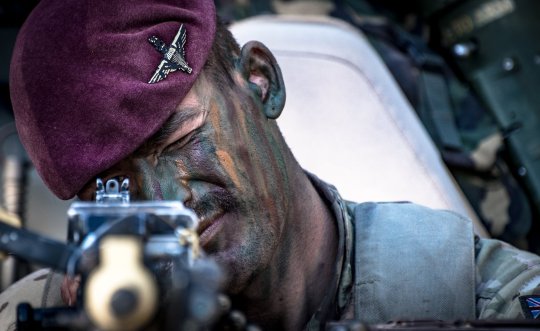
Working alongside them on missions out in Afghanistan I could see their reputation as the ‘brain shit’ of the British Army was well deserved. They’re most uncouth, sweary, and smelliest group of yobbos I’ve ever had the awful misfortune to meet. I’m kidding. The mutual respect and the ribbing went hand in hand. I doff my smurf hat to the cherry berries as ‘propah soldiers’ as they liked to say especially when they cast a glance over at the other elite regiments like HCav and the guards regiments.
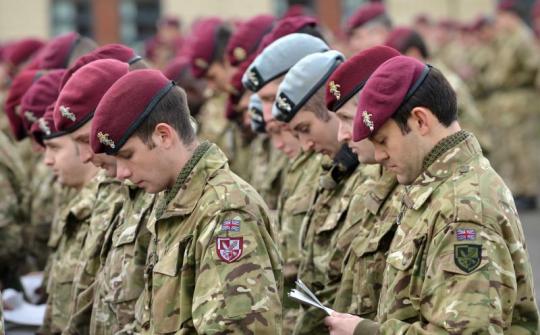
Don’t worry I’ve been called a lot worse! But I am grateful you don’t lump me with the other ‘poncey’ officers. Not sure what a female Rupert is called. The fact that I was never accused of being one by any of those I served with is perhaps something I take some measure of pride. There are not as many real toff officers these days compared to the past but there are a fair few Ruperts who are clueless in leading men under their charge. I knew one or two and frankly I’m embarrassed for them and the men under their charge.
I don’t know when the term PTSD was first used in any official way. My older sister who is a doctor - specialising in neurology and all round brain box and is currently working on the front lines in the NHS wards fighting Covid alongside all our amazing NHS nurses and doctors - took time out one evening to have a discussion with me about these issues. I also talked to one or two other friends in the psychiatric field too. In consensus they agree it was around 1980 when the term PTSD came into usage. Specifically it was the third edition of the Diagnostic and Statistical Manual of Mental Disorders (DSM-lll) published by the American Psychiatric Association in 1980 partly because as a result of the ongoing treatment of veterans from the Vietnam War. In the modern mind, PTSD is more associated with the legacy of the Vietnam War disaster.
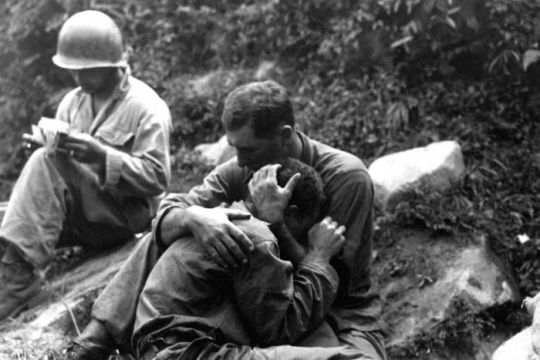
The importance of whether PTSD affected the ancient Greeks and Romans lies in the larger historical question of to what extent we can apply modern experience to unlock or interpret the past. In the period since PTSD was officially recognised, scholars and psychologists have noted its symptoms in descriptions of the veterans of past conflicts. It has become increasingly common in books and novels as well as articles to assume the direct relevance of present-day psychology to the reactions of those who experienced violent events in the historical past. In popular culture, especially television and film dramas, claims for the historical pedigree of PTSD are now often provided as background to the modern story, without attribution. Indeed we just take it as a given that soldier-warriors in the past suffered the same and in the same way as their modern day counterparts. We are used to the West to map the classical world upon the present but whether we can so easily map the modern world back upon the Greeks and Romans is a doubtful proposition when it comes to discussing PTSD.
Simply put, there is no definitive evidence for the existence of PTSD in the ancient world existed, and relies instead upon the assumption that either the Greeks or Romans, because they were exposed to combat so often, must have suffered psychological trauma.
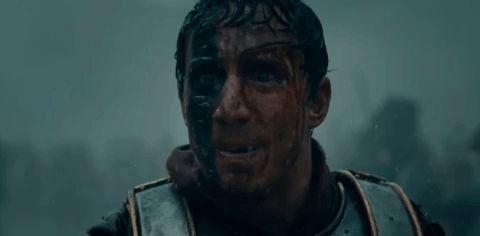
There are two schools of thought regarding the possibility of PTSD featuring in the Greco-Roman world (and indeed the wider ancient world stretching back into pre-history, myth and legend) – universalism and relativism. Put simply, the universalists argue that we all carry the same ‘wetware’ in our heads, since the human brain probably hasn’t developed in evolutionary terms in the eye blink that is the two thousand years or so since the Greco-Roman Classical era. If we’re subject to PTSD now, they posit, then the Greeks and the Romans must have been equally vulnerable. The relativists, on the other hand, argue that the circumstances under which the individual has received their life conditioning – the experiences which programme the highly individual software running that identical ‘wetware’, if you will – is of critical importance to an individual’s capacity to absorb the undoubted horrors of any battlefield, ancient or modern.
Whichever school one falls down on the side of is that what seems to happen in any serious discussion of the issue of PTSD in the ancient world is to either infer it indirectly from culture (primarily, literature and poetry) or infer it from a comparative historical understanding of ancient warfare. Because the direct evidence is so scant we can only ever infer or deduce but can never be certain. So we can read into it whenever we wish.
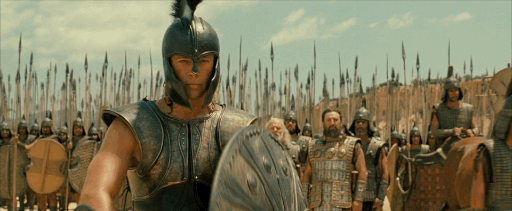
In Greek antiquity we have of course The Illiad and the Odyssey as one of the most cited examples when we look at the character traits of both Achilles and Odysseus. From Greek tragedy those who think PTSD can be inferred often point to Sophocles’s Ajax and Euripide’s Heracles. Or they look to Aeschylus and The Oresteia. I personally think this is an over stretch. Greek writers do; the return from war was a revisited theme in tragedy and is the subject of the Odyssey and the Cyclic Nostoi.
The Greeks didn’t leave us much to ponder further. But, with rare exceptions, the works from Graeco-Roman antiquity do not discuss the mental state of those who had fought. There is silence about the interior world of the fighting man at war’s end. So we are led to ponder the question why the silence?
This silence also echoes into the Roman period of literature and history too. Indeed when we turn to the Roman world, descriptions of veterans are rare in the writings that survive from the Roman world and occur most often in fiction.
In the first poem of Ovid’s Heroides, the poet writes about a returned soldier tracing a map upon a table (Ov. Her. 1.31–5):
...upon the tabletop that has been set someone shows the fierce battles, and paints all Troy with a slender line of pure wine:
‘Here the Simois flowed; this is the Sigeian territory,
here stood the lofty palace of old Priam, there the tent of Achilles...’
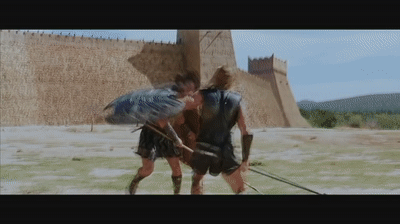
This scene provides an intimate glimpse of what it must have been like when a veteran returned home and told stories of his campaigns: the memories of battle brought to the meal, the crimson trail of the wine offering a rough outline of the places and battlefields he had experienced. The military characters in poems and plays show a world in which soldiers are ubiquitous, if somewhat annoying to the civilians. Plautus, for instance, in his Miles Gloriosus, portrays an officer boasting about his made-up conquests – the model for the braggart in A Funny Thing Happened on the Way to the Forum – and Juvenal complains about a centurion who stomps on his sandalled foot in the bustling Roman street.
Despite this silence, compelling works have been written that interweave vivid modern accounts of combat and its aftermath with quotes from ancient prose and poetry. At their best, these comparisons can illuminate both worlds, but at other times the concerns of the present-day author are imposed on the ancient material. But the question remains are such approaches truthful and valid in understanding PTSD in the ancient world?

So if arts and literature don’t really tell us much what about comparative examples drawn from military history itself?
Here again we are in left disappointed.
According to the Greek historian, Herodotus, in 480 B.C., at the Battle of Thermopylae, where King Leonidas and 300 Spartans took on Xerxes I and 100,000-150,000 Persian troops, two of the Spartan soldiers, Aristodemos and another named Eurytos, reported that they were suffering from an “acute inflammation of the eyes,”...Labeled tresantes, meaning “trembler,”. It is that Aristodemos later hung himself in shame. Another Spartan commander was forced to dismiss several of his troops in the Battle of Thermopylae Pass in 480 B.C, “They had no heart for the fight and were unwilling to take their share of the danger.”
Herodotus again in writing about the battle of Marathon in 490 B.C., cites an Athenian warrior who went permanently blind when the soldier standing next to him was killed, although the blinded soldier “was wounded in no part of his body.” Interestingly enough, blindness, deafness, and paralysis, among other conditions, are common forms of “conversion reactions” experienced and well-documented among soldiers today
Outside the fictional world, Roman military history tell us very little.
Appian of Alexandria (c. 95? – c. AD 165) described a legion veteran called Cestius Macedonicus who, when his town was under threat of capture by (the Emperor-to-be) Octavian, set fire to his house and burned himself within it. Plutarch’s Life of Marius speaks of Caius Marius’ behaviour who, when he found himself under severe stress towards the end of his life, suffering from night terrors, harassing dreams, excessive drinking and flashbacks to previous battles. These examples are just a few instances which seem to demonstrate that PTSD, or culturally similar phenomena, may be as old as warfare itself. But it’s worth stressing it is not definitive, just conjecture.
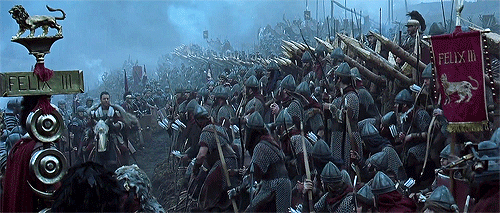
Of course of accounts of wars and battles were copiously written but not the hard bloody experience of the soldier. Indeed the Roman military man is described almost exclusively as a commander or in battle. Men such as Caesar who experienced war and wrote about it do not to tell us about homecoming.
It seems one of main challenges when we try to see military history through the lens of our definition of PTSD is to first understand the comparative nature of military history and what it is we are comparing ie mistaking apples for oranges.
The origin of military history was tied to the idea that if one understood ancient battle, one might fight and, more importantly, one might lead and strategise more effectively. In essence, much of the training of officers – even in the military handbooks of the Greeks and Romans – was an attempt to keep new commanders from making the same mistakes as the commanders of old. Military history is intended to be a pragmatic enterprise; in pursuit of this pragmatic goal, it has long been the norm to use comparative materials to understand the nature of ancient battle.
The 19th Century French military theorist Ardant du Picq argued for the continuity of human behaviour and assumed that the reactions of men under the threat of lethal force would be identical over the centuries: “Man does not enter battle to fight, but for victory. He does everything that he can to avoid the first and obtain the second....Now, man has a horror of death. In the bravest, a great sense of duty, which they alone are capable of understanding and living up to, is paramount. But the mass always cowers at sight of the phantom, death. Discipline is for the purpose of dominating that horror by a still greater horror, that of punishment or disgrace. But there always comes an instant when natural horror gets an upper hand over discipline, and the fighter flees”
These words offer insight to those of us who have never faced the terror of battle but at the same time assume the universality of how combat is experienced, despite changes in psychological expectations and weaponry, to name but two variables.
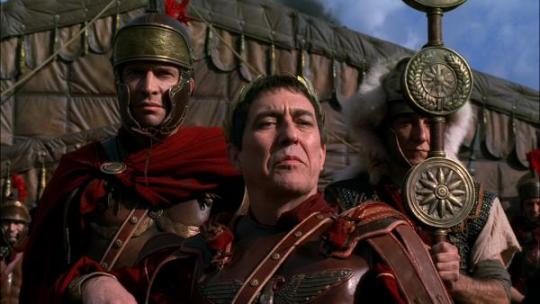
Another incentive for scholars and researchers is to turn to comparative material has been the growing awareness of the artificiality of how we describe war. A mere phrase such as ‘flank attack’ does not capture the bloody, grinding human struggle. Roman authors – especially those who had not fought – often wrote generic descriptions of battle. Literary battle can distort and simplify even as it tells, but if the main things are right – who won, who lost, and who the good guys are – the important ‘facts’ are covered. Even if one intends to speak the truth about battle, the assumptions and the normative language used to describe violence will affect the telling. We may note that the battle accounts in poetry become increasingly grisly during the course of the Roman Empire (perhaps owing to the growing popularity of gladiatorial games),while, in Caesar’s Gallic War, the Latin word cruor (blood) never appears and sanguis (another Latin word for blood) only appears in quoted appeals (Caes. B. Gall. 7.20, in the mouth of Vercingetorix, and 7.50, where the centurion M. Petronius urges his men to retreat). The realities of the battlefield are described in anodyne shorthand. In much the same way that the news rarely prints or televises graphic images, Caesar does not use gore, and perhaps for the same reason – to give a sense of reportorial objectivity.

Another element in the interpretive scrum is a given author’s goal in writing an account in the first place: Caesar, for example, was writing about himself, and he may have been producing something akin to a political campaign ad. Caesar makes Caesar look great and there is reason to believe that, if he was not precisely cooking the books, he did give them a little rinse to make him look more pristine. Given the many factors that complicate our ability to ‘unpack’ battle narratives, Philip Sabin has argued that the ambiguity and unreliability of the ancient sources must be supplemented by looking at the “form of the overall characteristics of Roman infantry in mortal combat”. Again the modern is used to illuminate that which is obscured by written accounts and the “the enduring psychological strains” are merely unconsciously assumed.
These legitimate uses of comparative materials have led to a sort of creep: because military historians have used observations of how men react to combat stress during battle to indicate continuity of behaviour through time, there appears to be a consequent expectation that men will also react identically after battle. This creep became a lusty stride with modern books written about the ancient world and PTSD.
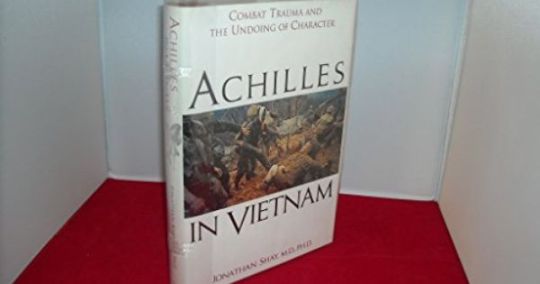
After I finished my tour in Afghanistan I read many books recommended to me by family and friends as well as comrades. One of these books is well known in military circles - at least amongst the thinking officer class - as an iconic work of marrying the ancient world and the modern experience of war. I read it and I was touched deeply by this brilliant therapeutic book. It was only months later I began to re-think whether it was a true account of PTSD in the ancient world.
This insightful book is called Achilles in Vietnam by Jonathan Shay. Shay is psychiatrist in Boston, USA. He began reading The Iliad with Vietnam veterans whom he was treating. Achilles in Vietnam, is a deeply humane work and is very much concerned with promoting policies that he hoped would help diminish the frequency of post-traumatic stress. His goal was not to explain ancient poetry but to use it therapeutically by linking his patients’ pain to that of the Iliad’s great hero. His book offers a conduit between the reader and the experiences of the men that Shay counsels. In the introduction to this work he makes a nod to Homerists while also asserting the primacy of his own reading:
“I shall present the Iliad as the tragedy of Achilles. I will not glorify Vietnam combat veterans by linking them to a prestigious ‘classic’ nor attempt to justify study of the Iliad by making it sexy, exciting, modern or ‘relevant’. I respect the work of classical scholars and could not have done my work without them. Homer’s poem does not mean whatever I want it to mean. However, having honored the boundaries of meaning that scholars have pointed out, I can confidently tell you that my reading of the Iliad as an account of men in war is not a ‘meditation’ that is only tenuously rooted in the text. “
After outlining the major plot points around which he will organise his argument, he notes, “ ‘This is the story of Achilles in the Iliad, not some metaphorical translation of it”.
The trouble was and continues to be is that many in the historical and medical fields began to rush to unfounded conclusions that Shay, on the issue of PTSD in the ancient world, had demonstrated that the psychological realities of western warfare were universal and enduring. More books on similar comparative themes soon emerged and began to enshrine the truth that PTSD was indeed prevalent throughout the ancient world and one could draw comparative lessons from it.
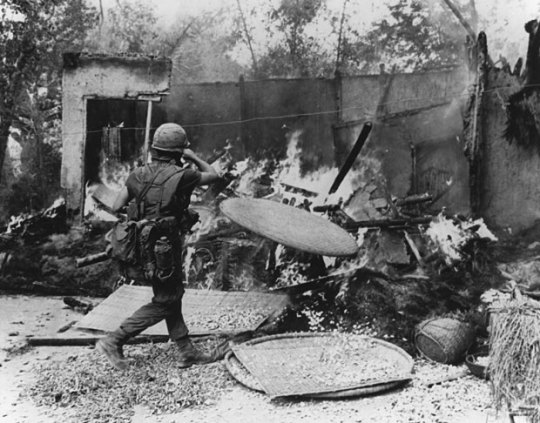
Perhaps one of the most influential books after Shay was by Lawrence Tritle. Tritle, a veteran himself, wrote From Melos to My Lai. It’s a fascinating book to read and there are parts that certainly resonate with my own experiences and those of others I have known. In the book Tritle drew a direct parallel between the experiences of the ancient Greeks and those of modern veterans. For instance, Xenophon, in his military autobiography, presents a brief eulogy for one of his fallen commanders, Clearchus. Xenophon writes that Clearchus was ‘polemikos kai philopolemos eschatos’ (Xen. An. 2.6) – ‘warlike and a lover of war to the highest degree’.
Tritle comments:
“The question that arises is why men like Clearchus and his counterparts in Vietnam and the Western Front became so entranced with violence. The answer is to be found in the natural ‘high’ that violence induces in those exposed to it, and in the PTSD that follows this exposure. Such a modern interpretation in Clearchus’ case might seem forced, but there seems little reason to doubt that Xenophon in fact provides us with the first known historical case of PTSD in the western literary tradition.”
Arguably in the West and especially our current modern Western culture is predicated at baulking at the notion of being ‘war lovers” as immoral. But such an interpretation speaks more of our modern Christianised ambivalence towards war; to the Spartans and Athenians the term would not have had a negative connotation. ‘Philopolemos’ is, in fact, a compliment, and the list of Clearchus’ military exploits functions as a eulogy. There are points where his analysis does not adequately address the divergences between ancient and modern experiences.
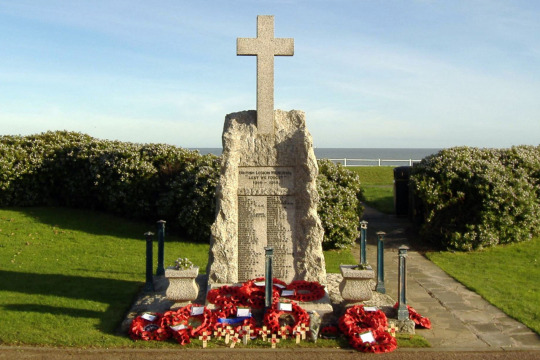
For all the talk of our Western culture being rooted in Ancient Greece and Rome we are not shaped by the same ethics. Our modern ethics and our moral code is Christian. There is no such thing as a secular humanist or atheist both owe a debt to Christianity for the way they have come to be; in many respects it’s more accurate to describe such people as Christianised Humanists or Christian Atheists even if they reject the theological tenets of the religious faith because they use Christian morality as the foundation to construct their own. Many forget just how brutal these ancient societies were in every day life to the point there would be little one could find recognisable within our own modern lives.
Now we come to third point I wish to make in determining where the Greeks or Romans actually experienced PTSD. This is to do with the little understood nature of PTSD itself. As much as we know about PTSD there is still much more we don’t know. Indeed one of the most problematic and complicated issues is the continued disagreement around the diagnosis and specific triggers of the disorder which remain little understood. We have to admit there are competing theories about what causes PTSD but, in terms of experiences that make it manifest, there are essentially three possible triggers: witnessing horrific events and/or being in mortal danger and/or the act of killing – especially close kills where the reality of one’s responsibility cannot be doubted. The last of these was strongly argued in another scholarly book by D. Grossman, On Killing, the Psychological Cost of Learning to Kill in War and Society (1995).
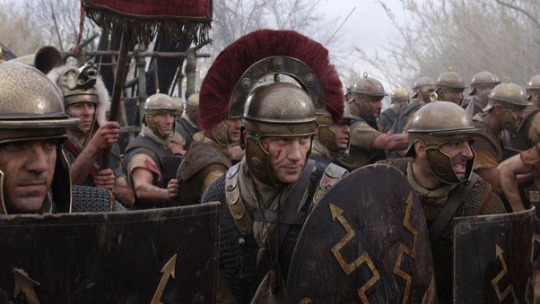
Roman soldiers had the potential to experience all of these things. The majority of Roman combat was close combat and permitted no doubt as to the killer. The comparatively short length of the gladius encouraged aggressive fighting. Caesar recounts how his men, facing a shield wall carried by the taller Gauls, leaped up on top of the shields, grabbed the upper edges with one hand, and stabbed downwards into the faces of their opponents (Caes. B. Gall. 1.52). As for mortal danger, Stefan Chrissanthos in his informative book, Warfare in the Ancient World: From the Rise of Uruk to the Fall of Rome, 3500BC-476AD, puts it this way: “For Roman soldiers, though the weapons were more primitive, the terrors and risks of combat were just as real. They had to face javelins, stones, spears, arrows, swords, cavalry charges, and maybe worst of all, the threat of being trampled by war elephants.”
Such terrors are regularly attested. During his campaign in North Africa, Caesar, noting his men’s fear, procured a number of elephants to familiarise his troops with how best to kill the beasts (Caes. B. Afr.72). It should also be noted that it was not unusual for the reserve line to be made up of veterans because they were better able to watch the combat without losing their nerve. Held in reserve, they had to watch stoically as their comrades were injured and killed, and contemplate the awful fact that they might suffer the same fate. This was not a role for the faint of heart.
However, while the Romans certainly had the raw ingredients for combat trauma, the danger for a Roman legionary was much more localised. Mortars could not be lobbed into the Green Zone, suicide bombers did not walk into the market, and garbage piled on the street did not hide powerful explosives. The danger for a Roman soldier was largely circumscribed by his moments on the field of battle, and even here, if he was with the victorious side, the casualties were likely to be light: at Gergovia, a disaster by Caesar’s standards, he lost nearly seven hundred men (Caes. B. Gall. 7.51). In his victory over Pompey the Great at Pharsalus, his casualties numbered only two hundred (Caes. B. Civ. 3.99).
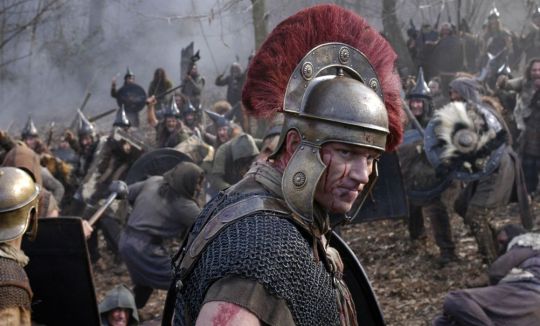
So we are left with the disturbing question: were the stressors really the same?
This is the part where I also defer to my eldest sister as a doctor and surgeon specialising in neurology and just so much smarter than myself.
My eldest sister holds the view in talking to her own American medical peers that despite similar experiences in Afghanistan and Iraq, British soldiers on average report better mental health than US soldiers.
My sister pointed out to research study done by Kings College London way back around 2015 or so that analysed 34 studies produced over a 15-year period (up to 2015) and found that overall there has been no increase in mental health issues among British personnel - with the exception of high rates of alcohol abuse among soldiers. The study was in part inspired the “significant mental health morbidity” among U.S. soldiers and reports that factors such as age and the quality of mental health programs contribute to the difference between the two nation’s servicemen and women.
She pointed out that these same studies showed that post-traumatic stress disorder afflicts roughly 2 to 5% of non-combat U.K. soldiers returning from deployment, while 7% of combat troops report PTSD. According to a General Health Questionnaire, an estimated 16 to 20% of U.K. soldiers have reported symptoms of common mental disorders, similar to the rates of the general U.K. population. In comparison, studies around the same time in 2014 showed U.S. soldiers experience PTSD at rates of 21 to 29%. The U.S. Department of Veteran Affairs estimated PTSD afflicted 11% of veterans returning from Afghanistan and 20% returning from Iraq. Major depression was reported by 14% of major soldiers according to another study commissioned by RAND corporation; roughly 7% of the general U.S. population reports similar symptoms.
It’s always tough comparing rates between countries and is not a reflection of the quality of the fighting soldier. But one finding that consistently and stubbornly refuses to go away is that over the past 20 years reported mental health problems tend to be higher among service personnel and veterans of the USA compared with the UK, Canada, Germany and Denmark.
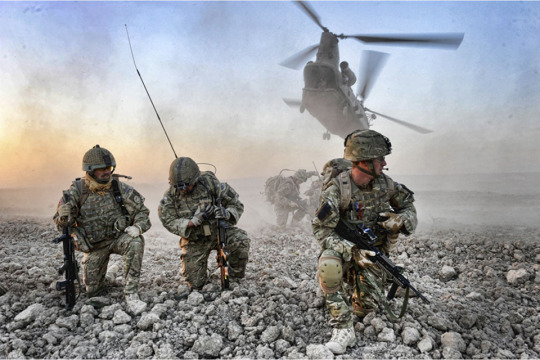
However my sister strongly cautioned against making hasty judgements. And there could be many variable factors at play. One explanation is that American soldiers are more likely than their British counterparts to be from the reserve forces. Empirical studies showed reservists from both America and British troops were more likely to experience mental illness post-deployment. It was also worth pointing out that American soldiers also tended to be younger - being younger and inexperienced as well as untested on the battlefield, service personnel would naturally run the risk of greater and be more vulnerable to mental illness.
In contrast, the elite forces of the British army, such as your brother’s Parachute Regiment or the Royal Marines, were found to be the least affected by mental illness. It was found that in spite of elite forces experiencing some of the toughest fighting conditions, they tended to enjoy better mental health than non-elite troops. The more elite a unit is or more professional then you find that troops tend to enjoy a very deep bonds of camaraderie. As such the social cohesion of these fighting forces provides a psychological protective buffer. Not for all, but for many.
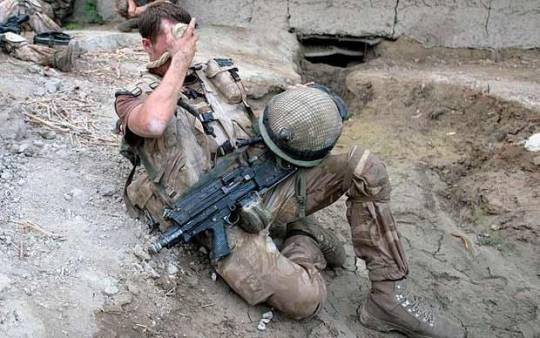
More intriguing are new avenues of discovery that might go a long way to actually understanding one of the root causes of PTSD. According to my sister, recent research carried out in the US and Europe and published in such prestigious medical journals as the New England Journal of Medicine (US) and the Lancet (UK), seems to establish a causal link between concussive injury and PTSD.
One recent study looked at US soldiers that concerned itself with the effects of concussive injuries upon troops after their return from active duty during the war in Iraq.
Of the majority of soldiers who suffered no combat injuries of any sort, 9.1 per cent exhibited symptoms consistent with PTSD. This allows a baseline for susceptibility of roughly 10% of the population. A slightly higher number (16.2%) of those who were injured in some way, but suffered no concussion, also experienced symptoms. As soon as concussive injuries were involved, however, the rates of PTSD climbed dramatically.
Although only 4.9% of the troops suffered concussions that resulted in complete loss of consciousness, 43.9% of these soldiers noted on their questionnaires that they were experiencing a range of PTSD symptoms. Of the 10.3% of the unit who suffered concussion resulting in confusion but retained consciousness, more than a quarter (27.3%) suffered symptoms. This suggests a high correlation between head trauma and the occurrence of subsequent psychological problems. The authors of the study note that ‘concern has been emerging about the possible long term effect of mild traumatic brain injury or concussion...as a result of deployment related head injuries, particularly those resulting from proximity to blast explosions’
Although these results are preliminary, if confirmed they have profound implications for anyone trying to understand the nature of warfare in the ancient world, especially the Western world.
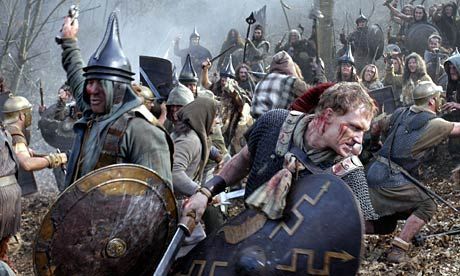
So why does it matter?
In Roman warfare, wounds were most often inflicted by edged weapons. Romans did of course experience head trauma, but the incidence of concussive injuries would have been limited both by the types of weapons they faced and by the use of helmets. Indeed the efficacy and importance of headgear for example can be deduced from the death of the Epirrote general Pyrrhus from a roof tile during the sack of Argos. It is likely that the Romans designed their helmets with an eye to blunting the force of the blows they most often encountered. Connolly has argued that helmet design in the Republican period suggests a crouching fighting stance (see P. Connolly, ‘The Roman Fighting Technique Deduced from Armour and Weaponry’, Roman Frontier Studies (1989). However my own view is that the change in helmet design may signal instead a shift in the role of troops from performing assaults on towns and fortifications when the empire was expanding (and the blows would more often rain from above) to the defence and guarding of the frontiers.
While the evidence is clear that concussion is not the only risk factor for PTSD, it is so strongly correlated that it suggests that the incidence of PTSD may have risen sharply with the arrival of modern warfare and the technology of gunpowder, shells, and plastic explosives. Indeed, accounts of shell shock from the First World War are common, and it was in the wake of that war that those observing veterans suspected that neurological damage was being caused by exploding shells.
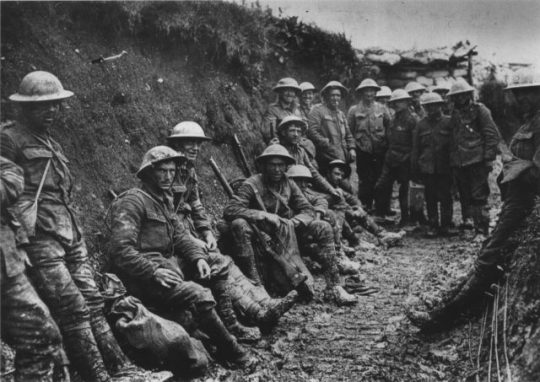
For soldiers of the Second World War and down to our modern day, an artillery barrage is like an invention of hell.
As one American put it in his memoirs of fighting the Japanese at Peleiu and Okinawa, “I developed a passionate hatred for shells. To be killed by a bullet seemed so clean and surgical but shells would not only tear and rip the body, they tortured one’s mind almost beyond the brink of sanity. After each shell I was wrung out, limp and exhausted. During prolonged shelling, I often had to restrain myself and fight back a wild inexorable urge to scream, to sob, and to cry. As Peleliu dragged on, I feared that if I ever lost control of myself under shell fire my mind would be shattered. To be under heavy shell fire was to me by far the most terrifying of combat experiences. Each time it left me feeling more forlorn and helpless, more fatalistic, and with less confidence that I could escape the dreadful law of averages that inexorably reduced our numbers. Fear is many-faceted and has many subtle nuances, but the terror and desperation endured under heavy shelling are by far the most unbearable” (see E.B. Sledge, With the Old Breed at Peleiu and Okinanwa, 2007).
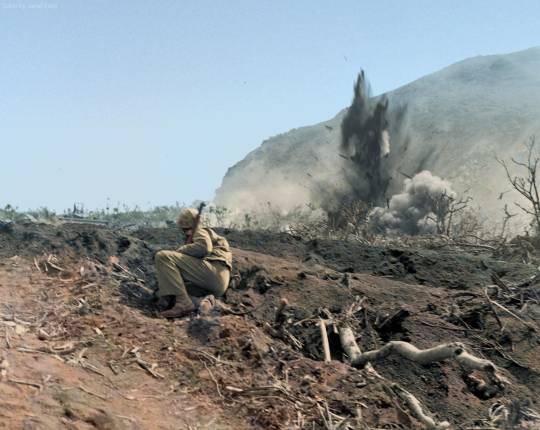
The psychological effect of shelling seems to result from the combined effect of awaiting injury while at the same time having no power to combat it.
There is another aspect that I alluded to above which is the psychological and societal conditioning of the Roman soldier. In other words a Roman male’s social and cultural expectations of his place in the world. Feelings of helplessness and fatalism were probably a less alien experience for most Romans – even those in the upper classes. In general, the Romans inhabited a world that was significantly more brutal and uncertain than our own.
This another way of saying that the Roman and 21st century combat are very different in a variety of ways that subject the modern soldier to a good deal more stress than the legionary was ever likely to suffer. And the Roman’s societal preparation – his life before the battle – was far more robust than that we enjoy today.
Take infant mortality. In the modern developed world, our infant mortality rates are about ten per thousand. In Rome, it is estimated that this number was three hundred per thousand. Three-tenths of infants would die within the first year, and an additional fifth would not make it to the age of ten - 50% of children would not survive childhood. Anecdotal evidence supports these statistics: Cornelia, the mother of the Gracchi, gave birth to twelve children between 163 bc and 152 bc; all twelve survived their father’s death in 152 bc, but only three survived to adulthood. Marcus Aurelius and his wife, Faustina, had at least twelve children but only the future emperor Commodus survived.
Then look at how that child grows up. The typical Roman child would be raised in a society that readily accepted ultra-violent arena entertainment, mob justice, frequent and bloody warfare as a fact of life. This was reinforced by religious and societal encouragement to see war as natural and beneficial, open butchering of food animals, a total lack of support structures for the poor and less able.
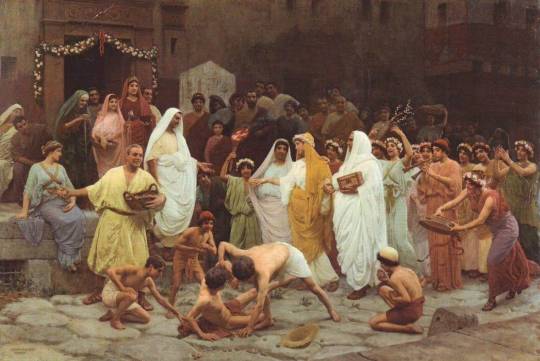
Compared to the legionary our modern soldier has been protected from such realities to a greater degree than at any other point in history, and will thus be far less well prepared for the horror of a warfare that contains far more stress factors than for a man who might fight a handful of battles in his military career, with long periods of relative calm in between, state of war notwithstanding. Modern special and elite forces training often emphasises the brutalisation and ‘rebuilding’ of the recruit in readiness for this step into darkness, but it seems likely that no such conditioning would have been needed two thousand years ago.
I would argue that we experience war very differently from the way the Romans did. Our modern identity is defined far more by our Western Christian heritage than our Western Classical roots. They are in fact world apart when it comes to ethics and morality. Consider the fact that when we talk of war and killing today we often do so through conflict between our civilian moral codes – which offer the strict injunction not to do violence to other human beings – and wartime, when men are commanded to violate such prohibitions. It is a terrible thing to try to navigate ‘Thou shalt not kill’ and the necessity of taking a life in combat.
It is sometimes the case that the qualities that make the best soldier do not make the best civilian, a point amply attested in Greek poetry by heroes such as Heracles and Odysseus.
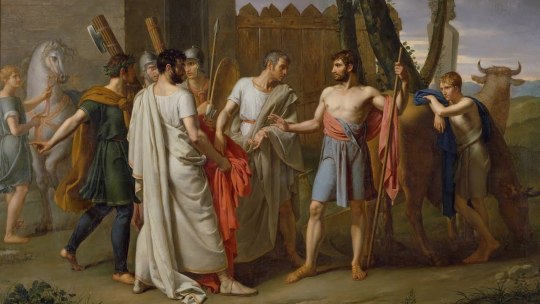
The Romans, for their part, celebrated heroes such as Cincinnatus, who could command effectively and then leave behind the power he wielded to return to his humble plough. It is important, however, when evaluating combat and its effects in the ancient world, that we do not read our ambivalence about violence onto the Romans. They inhabited an empire whose prosperity was quite openly tied to conquest.
As M. Zimmerman writes in his academic article, “Violence in Late Antiquity Reconsidered’ (2007), “The pain of the other, seen on the distorted faces of public and private monuments, or heard in the screams of criminals in the amphitheatre, reassured Romans of their own place in the world. Violence was a pervasive presence in the public space; indeed, it was an important basis for its existence, pertaining as it did not only to victories over external enemies but also to the internal order of the state.”
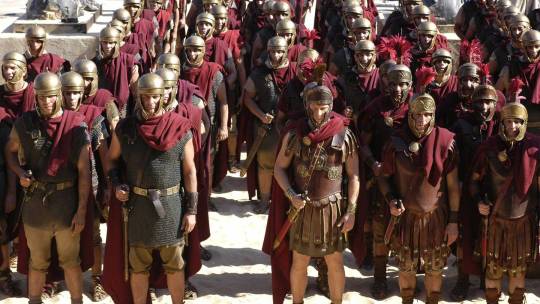
Violence then was both the means and the expression of Roman power. The Roman soldier was its instrument. The Roman warrior then would have brought a different perspective to lethal violence, and would have had a far more restricted moral circle to his modern counterpart – his friends and family, clan, patron and clients, as opposed to millions of fellow citizens via the internet and social media.
Part II follows next post
#question#ask#PTSD#war#roman#greek#classical#legionary#spartan#mental health#depression#trauma#warfare#british army#mental illness#homecoming#soldiers#combat veterans#veterans
46 notes
·
View notes
Note
Hi!! 💕I was reading across your medieval queer history tag, and I came to the part of Muslims and homosexuality where you mention the active / passive narrative that this activity had.
I had two questions and I don't know if you can help me with them. I was wondering if there was something similar to that position in Nicky's time (?) at the European part of the world. And based on that, would it be a problem for the sexual activities that Nicky and Joe might have had? (sorry for this insane curiosity) I don't know if I'm being clear, haha. I mean, would it be a problem being active/passive for Nicky and Joe? ( based on common Islamic and/or European thought of the 11th century)
Thank you!!
Hmm. I feel like this is a better subject for fanfic (i.e. how Nicky and Joe viewed their relationship in the early days) because it touches on something historians can’t answer: how historical individuals privately viewed their own internal/emotional decisions and preferences. Obviously, Nicky and Joe themselves are fictional, so the only inner feelings they themselves had about how their relationship first developed, whether in its sexual components or otherwise, are the ones that are created for them by a team of modern writers and showrunners. As a historian, I can offer some perspective on the institutional, legal, and societal mores and customs that influenced how queer behavior was collectively viewed, tolerated, or restricted, but I can’t say how any given individual would have then interpreted that to themselves. Obviously, some gay people have been raised in such deeply self-hating environments that their internalized homophobia is very embedded and they struggle for years to get over it. Some others have been raised in the same environment but have never actually accepted any of it and have less difficulty in leaving it behind. Once again, this goes into the realm of speculation rather than strictly provable history, and which goes double for fictional characters.
Queer people have always existed in a complicated and sometimes contradictory relationship with the mainstream (that is, often heteronormative) dominant society. Sometimes they accept all of it in an attempt to “pass” or because they have been taught to be homophobic, sometimes they choose to selectively adopt parts of it but try to live a secret “second life,” sometimes they reject all of it. These choices are conditioned by personal safety/family background, political, cultural, religious, and social environments, formal and informal education, kinship and friendship networks, positive/negative reinforcement, individual character, and so on. There is not necessarily a “wrong” choice for a queer person to make, because each course of action comes with its own risks and rewards, but if you’re choosing to embrace your queer identity and to live out its truth (as Joe and Nicky seem to have done relatively soon after they met), then that will involve an element of rejecting whatever constraints heteronormative society has placed on you. After all, the formal legal conventions about sodomy in the Middle Ages weren’t developed in consultation with actual queer people. They reflected the concerns of conservative establishment clergymen, who weren’t interested in promoting social acceptance of it (and yet again, this doesn’t touch on THEIR actual feelings or whatever they might have done in private). I’ve discussed the complexity of disentangling historical homoromanticism (which was pretty widely celebrated in the medieval era) and historical homosexuality (which had a rockier time, but as I wrote about in this ask, the attempted policing of sexuality and sexual behavior was as much the case for m/f relationships as m/m or f/f ones -- nobody got away from this and it wasn’t just for the gays.)
Basically, I personally don’t think that either Joe or Nicky would have had a problem with sex or certain sexual positions, just because if both of them had reached the point of deciding that a Catholic/Muslim was their true love and they were going to run off together and be a couple no matter what anyone said about it, that already entailed rejecting a huge amount of the ideology they were originally taught and grew up with. It’s again a subject for fanfic how much Joe and Nicky were personally comfortable with being queer before they met each other, so this would more likely be a rejection of religious teaching about the unworthiness/evilness of the rival faith (as Nicky says, the love of his life was from the people he had been taught to hate). Since almost all medieval queer behavior and views on queer people had a religious component, if Joe/Nicky had gotten as far as rejecting the religious tenet that told them the other was Evil, they were (again, in my opinion) extremely unlikely to use any of those old religious arguments for prohibiting or proscribing certain kinds of sexual activity. I’m sure they had to negotiate many issues in the early days of their relationship (as I write about in DVLA), but they’re clearly head over heels in love with each other, wildly attracted to each other and have been for almost a millennium, and eager to embrace the physicality of that relationship, so I don’t personally see this as being a major stumbling block.
That said, you did ask about European views on sodomy in the 11th century and whether there was a parallel to Islamic views on the moral acceptability of the active vis-a-vis the passive partner. Since antiquity, there has always been less “shame” attached to the penetrative/top partner in sex, no matter whether the receiving partner is male or female. Ancient Greece is another example of this, where the adult man could not be penetrated without insult to his manhood and dignity, but the fact of him penetrating a younger man/teenage boy was a fine and even accepted rite of passage. We can obviously talk about how this is related to phallocentrism and misogyny, because the person “receiving” sex is usually expected to be a woman or a woman-equivalent person, which entails lower social status. The dominant male can take whichever sexual partner he pleases, and it’s a mark of honor and status for him to be virile (the very, very ancient chestnut about why playboys are tolerated and admired while sexually active women are “sluts.”) The gender of his partners might not matter as much as their social class, their status in relation to his, his “right” to expect sexual availability from them, and a whole lot of other factors. This could be and also was the case in medieval Europe. But may we point out that the men engaging in these kind of explicitly unequal relationships, which are more about reinforcing power and control than real desire, are very, very unlike the equal and loving mutual partnership between Joe and Nicky, where they were clearly happy to please and respect the other in whatever way.
It has not always been the case that same-sex activity would automatically be defined and suspect, though yes, there has never been an instance in Western history where it was placed uncomplicatedly on the same level as opposite-sex activity. It had to be constructed that way. As I keep saying, modern homophobia is a lot more stringent and explicit than any medieval expressions thereof, because if “homosexuality” was not constructed as a clearly recognized identity, there was less ability to rail against it. In fact, the usual rhetorical tactic was to just ignore it. Sodomy is known as the ��silent sin” or “peccatum mutum” in Latin, because moralists usually didn’t talk about it or discuss it or give it an actual framework for debate and thus implied legitimacy. There were obvious exceptions (Peter Damian, Peter the Chanter, Bernardino of Siena, Heinrich Kramer, etc, etc) and as the medieval era went on, homosexuality became more grouped in with other undesirables. But that also reflected a growing visibility/awareness among people as to what it was. As I keep saying, you can’t be anxious about something, you can’t be worried about people being susceptible to it, you can’t be worried that it’s happening in reality, if it’s just an abstract concern of rhetoric that only a handful of churchmen know about. The increasing visibility of queerness as a category of exclusion in late medieval polemics reflected a) the social stress of the crises of the late medieval world and the usual function of Others as a scapegoat and b) the fact that by then, people must have had enough awareness of it as a pattern of consistent behavior for clerics to get mileage out of attacking it.
Anyway. In an attempt to summarize: historians can’t possibly know how historical queer people felt about themselves, if they were influenced by societal or internalized homophobia (itself quite different from modern homophobia), how much of the dominant social narrative they accepted, the reasons for the choices that they made, if they saw their queer preferences as a sin or as a valid lifestyle, and so on. But it seems unlikely that historical queer people specifically in loving long-term relationships, such as Joe and Nicky, would be unduly tied to much of that, and that has always been the case.
36 notes
·
View notes
Note
hi!! saw that you’ve been having difficulties with the message section, I wouldn’t mind putting the reading on here
Hi!
Thank you for buying me this delicious hot beverage. I drank irish cream black coffee with rice milk while writing your interpretation. I hope you will enjoy reading it as much as I did writing! And I listened to Leon Bridges - Shy while writing. ;)
Your dominant planets are: 1. Saturn, 2. Mercury and 3. Moon. Your dominant signs are: 1. Leo, 2. Aquarius and 3. Pisces. Your main mode is Cardinal. You are Air dominant.
FAMILY, SIBLINGS, EARLY LIFE
You have Cancer Sun in the 2nd house. Your father was a bit of a passive figure in the family. He likes to stay at home, indulge a bit, but he is also a hard worker. He values family and home. He can be moody and stubborn. You have Libra Moon in the 5th house. Your mother is kind, loving, playful and has a childlike spirit. You have Virgo Lilith in the 4th house. The “negative” side of Lilith could happen here. You might be over critical of your family members, nit picky, a bit controlling and bossy. You might be of help to them, but you expect this help returned. You might be a bit of a “user” at times. And expect your family members or siblings, share your possessions, items, belongings, even money with you. You have Sun square Moon. Your mother and father are quite different personalities wise. They have different characters and traits. They might have not agreed on the style of your upbringing or they were not in sync in the style of parenting you. You have very strongly aspected Sun. You might have felt a bit restricted, limited and not supported by your father. You might have felt like he didn’t give you enough praise and thank yous. You have a deep and complex relationship with your mother. You have Virgo IC. You learnt how to speak and read early on. You were a responsible and mature child. Parents emphasized realistic goals for you and to choose something practical to do in life. You liked to read as a child or your parents read to you often. If you have any siblings, they are Leo, Libra, Taurus, Virgo or Gemini.
PARTNERSHIPS AND FRIENDSHIPS
You have Leo Venus in the 3rd house. This is who you attract, what you value in yourself and others. You attract lively, childlike, talkative people. Who are outgoing, generous, kind and have an inner child. You like to shine in your local town, among your siblings, cousins and family relatives. You might be the popular, well liked cousin! You have Libra Mars in the 5th house. This is how you approach your crush, how you act, what you’re passionate about. You are a bit passive when it comes to taking action. But it’s still sly and calculating. You might flirt with people unintentionally. You like your attention reciprocated back. You might like someone, but then back off a bit and just study and observe them for a while. You can appear cold and detached. You like giving compliments to others. You have nice manners and dress well. You have a nature sense for fashion and know what looks good on you. You have Venus sextile Mars. You might be attracted to younger partners or partners who energize you. Someone who uplifts you, motivates you and brings you out of your shell. You have Venus opposite Jupiter. You might be over loving and over generous, especially when you’re in love. You could be too generous with your money, attention, affection, praise, admiration and compliments. You have Venus trine Saturn. You like partners that are younger or older than your own age. You might be attracted to responsible, reliable people, who are ambitious, have high status or are just very hard workers. You have Venus opposite Uranus. You might have a long distance relationship at some point in life. Or you could start online dating. You like your partnerships to have a friendly air first. You might like to be friends before you are lovers. You could also date your friends. You have Libra, Scorpio, Taurus, Aries, Capricorn and Cancer, Virgo, even Gemini friends.
CAREER, PROFESSIONAL LIFE, PUBLIC IMAGE
You have Pisces MC. You might be a caretaker or help others and guide them somehow. YOu might also help people organise their life. You will be seen as caring, imaginative, creative, loving, compassionate and an old soul. You have Aries Saturn in the 11th house. You might like to work on your own or don’t like to network as much. You might be a great leader of a club, group or community. You have Aquarius Jupiter rx in the 9th house. You could be a teacher, life coach, motivational speaker or someone is a mentor to others. You could work in the health field, nursing, business, finance or accounting. You might be a professor or an educator on a topic. You have Virgo North Node in the 4th house. This indicates your life purpose. You could specialize in whichever topic you are willing to research more in-depth. You might like to take care of your mind and body. You are an excellent host! You might often host parties or gatherings at your home. You are a people’s person. You are called in this lifetime to organise, establish healthy boundaries with your family members, take care of your health. You would benefit greatly from owning a pet. You might be interested in dietetics, nutrition, wellness, mental and physical wellbeing. You’ll need to create a steady routine, focus on the now and your day-to-day life. You might work from home, online or if you have a family business, continue that. You have Pisces Part of Fortune in the 10th house. This represents your natural luck and good charm. You might be at your happiest when you help others, when you “heal” someone, when you can show your imaginative and creative side.
ADDITIONAL OBSERVATIONS
You have Libra Chiron in the 5th house. There is a certain wound or a past hurt when it comes to your one on one relationships. You might have been rejected by your first crush or they didn’t like you back. You might not have an ideal example when it comes to a healthy relationship. Maybe your parents separated or they didn’t have a healthy relationship, so that ruined the image of relationships a bit for you. You have Pisces Ceres in the 10th house. This is how you take care of others and how you like to be nurtured. For you it is important to allow yourself to get lost in daydream at least for a bit or listen to music, or just a creative outlet for your emotions. It’s how you stay emotionally sane. You like to be of help to others, do things for them, give them your unconditional love and support. You have Cancer Juno in the 2nd house. This indicates your ideal partner, your ideal soulmate, be it platonic or romantic. I find it interesting that it is the same as your Sun sign and position! This would mean you would like someone who is the same as you. You might like a partner who is caring, compassionate, loving, kind, highly opinionated, stubborn, love and values home, tradition, family. Likes security, safety and comfort. Someone who is an excellent chef as well! You have currency Pluto, Saturn and Jupiter transiting your 8th house. You might find it harder or easier for at least a half of a year to gain money from others. You might reevaluate, think more of gain better focus on the following topics: shared resources, sex, physical intimacy, dee trusted bonds, spirituality, occult, mysticism, inheritance, death, transformation and rebirths. You might feel like you are in a transitory period. You could also undergo many internal transformations. This is an excellent time to talk to others on a deep level or even therapy. You could also be an excellent listen or somehow a bit of a therapist to OTHERS.
CHART RULER
Your chart ruler is Mercury. The chart ruler of the 1st house is in the 3rd house. Your personality shines through best when you are connecting with your peers, siblings, cousins, people from your local hometown, your elementary and high school friends. Your ego, character, self esteem, self image might develop through 3rd house topics, such as writing, communicating, learning a new skill, connecting people from your local scene, hanging out with your siblings and peers. This is also a part of your life purpose besides Virgo North Node in the 4th house. Here is an additional video on the topic by a fellow astrologer: https://www.youtube.com/watch?v=rBu9sY2RHJI .
HOUSE RULERS
The ruler of the 1st house is in the 3rd house. You may seem like “the girl (or boy) next door. Life is oriented toward communicating, gathering information and daily interactions. You gossip about the way people look. The ruler of the 2nd house is in the 5th house. You use your money for artistic projects. You are possessive of creative projects. Financial security depends upon your personal creativity. The ruler of the 3rd house is in the 2nd house. You discuss issues of self-worth and self-esteem. Writing is a way to earn a living. Your ability to communicate affects your ability to make money. Siblings affect your self-worth. Gathering information is oriented toward making money. The ruler of the 4th house is in the 3rd house. Home is a place to have lively conversations. Cultural upbringing has a strong bearing on your thoughts. Feeling included or rejected by your family influences your day to day interactions. Home is a place where people come and go. You bring your private inner self with you when you write, keep a journal or blog. The ruler of the 5th house is in the 3rd house. You communicate in a playful and lighthearted way. Romance and fun express themselves through a love of reading and writing. Fun is found through gossiping. Relaxation comes through conversation and writing. The ruler of the 6th house is in the 6th house. You work in a health-related field. Your daily habits impact your ability to find a job. You create habits and routines that focus on health, work, and relationships with employees, coworkers and animals. The ruler of the 7th house is in the 9th house. Partners help you expand your horizons. Your partner needs to be broad-minded. You want to be with someone who likes to discuss philosophical topics. Your open enemies are people from other cultural or religious backgrounds. The ruler of the 8th house is in the 11th house. You find it hard to be “just friends.” You bring your need for depth interactions to friendships. You need to belong to groups of like-minded people who share your intensity. Your groups and clubs involve research and investigation. You join occult groups. You have to adjust your debt to achieve long term goals and dreams. The ruler of the 9th house is in the 9th house. You find meaning by devising your own personal belief system. You travel to expand your horizons. You gain wisdom by learning about religion. You find meaning in higher education. The ruler of the 10th house is in the 8th house. You bring a professional approach to depth psychology. You find your true vocation by exploring occult subjects. Your career revolves around the need for intensity of experience. Your career involves working with other people’s emotional baggage. Your true vocation involves in- depth interactions with other people. You achieve recognition as a researcher. You receive awards for your work with people on the fringe of society. The ruler of the 11th house is in the 5th house. You are friends with all your romantic partners. You bring your social awareness to your children. The people you connect with are self-expressive and entertaining. You belong to artistic groups. You’re in a band. You are a huge fan of the arts. The ruler of the 12th house is in the 3rd house. You talk about things that make you sad. Your imagination is stirred by talking and writing. You work your dreams into your daily conversations and writing. You have a dreamy voice. You bring imagination to your writing and the way that you speak.
13 notes
·
View notes